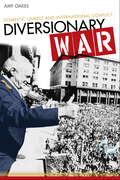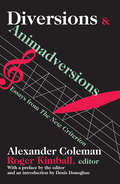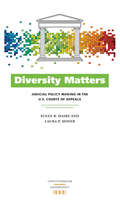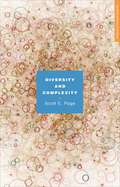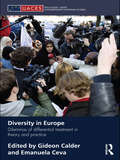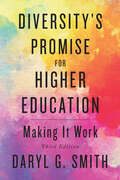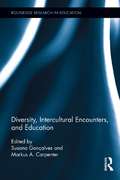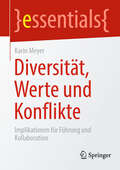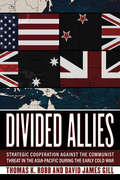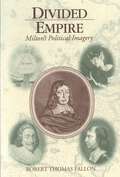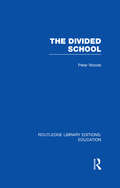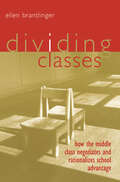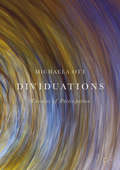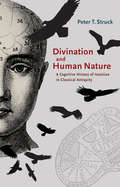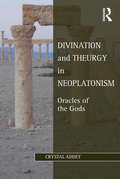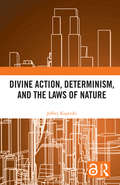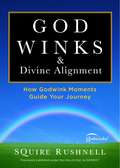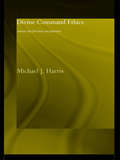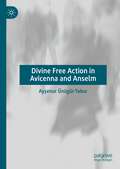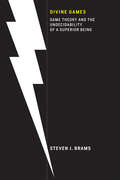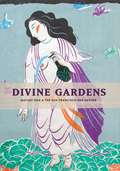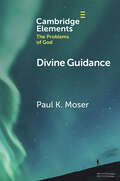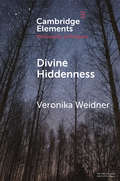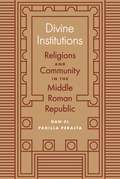- Table View
- List View
Diversionary War: Domestic Unrest and International Conflict
by Amy OakesThe very existence of diversionary wars is hotly contested in the press and among political scientists. Yet no book has so far tackled the key questions of whether leaders deliberately provoke conflicts abroad to distract the public from problems at home, or whether such gambles offer a more effective response to domestic discontent than appeasing opposition groups with political or economic concessions. Diversionary Waraddresses these questions by reinterpreting key historical examples of diversionary war-such as Argentina's 1982 Falklands Islands invasion and U. S. President James Buchanan's decision to send troops to Mormon Utah in 1857. It breaks new ground by demonstrating that the use of diversionary tactics is, at best, an ineffectual strategy for managing civil unrest, and draws important conclusions for policymakers-identifying several new, and sometimes counterintuitive, avenues by which embattled states can be pushed toward adopting alternative political, social, or economic strategies for managing domestic unrest.
Diversions and Animadversions: Essays from "The New Criterion"
by Alexander ColemanThis volume contains nearly all the criticism that Alexander Coleman wrote for The New Criterion between 1994 and 2003. A specialist in Spanish, Portuguese, and Latin American literature, Coleman was also a superb essayist on music, and his wide erudition, as revealed in these writings, demonstrates an easy mastery of the entire modernist tradition. Diversions and Animadversions is divided into three parts. The first contains Coleman's literary essays including a lengthy piece on Eba de Quieros, the great master of Portuguese realism, and shorter pieces on the Argentinian writer and Borges disciple, Adolfo Bioy Casares, as well as a review of the most recent translation of the poetry of Federico Garcia Lorca. Coleman's greatest passion, however, was for music, and part two contains essays, concert and book reviews, and reports on the cultural situation of music. Among the subjects examined here are the operas of Schoenberg, Berg, Richard Strauss, the recently published letters of Toscanini, the music criticism of Virgil Thomson, the fluctuating critical reputation of Jean Sibelius, and the authentic performance practice movement, along with considerations of such instrumentalists as Sviatoslav Richter and Alicia de Larrocha. The book concludes with Coleman's travel writings, which are both evocative mood pieces and incisive social and political commentary. Graced with personal appreciations by Roger Kimball and Denis Donoghue, this volume encapsulates the work of a writer of rare wit, capacious learning, and eager, if gently ironical, curiosity.
Diversity Matters: Judicial Policy Making in the U.S. Courts of Appeals (Constitutionalism and Democracy)
by Susan B. Haire Laura P. MoyerUntil President Jimmy Carter launched an effort to diversify the lower federal courts, the U. S. courts of appeals had been composed almost entirely of white males. But by 2008, over a quarter of sitting judges were women and 15 percent were African American or Hispanic. Underlying the argument made by administration officials for a diverse federal judiciary has been the expectation that the presence of women and minorities will ensure that the policy of the courts will reflect the experiences of a diverse population. Yet until now, scholarly studies have offered only limited support for the expectation that judges' race, ethnicity, or gender impacts their decision making on the bench. In Diversity Matters, Susan B. Haire and Laura P. Moyer employ innovative new methods of analysis to offer a fresh examination of the effects of diversity on the many facets of decision making in the federal appellate courts. Drawing on oral histories and data on appellate decisions through 2008, the authors' analyses demonstrate that diversity on the bench affects not only individual judges' choices but also the overall character and quality of judicial deliberation and decisions. Looking forward, the authors anticipate the ways in which these process effects will become more pronounced as a result of the highly diverse Obama appointment cohort.
Diversity and Complexity (Primers in Complex Systems #2)
by Scott PageThis book provides an introduction to the role of diversity in complex adaptive systems. A complex system--such as an economy or a tropical ecosystem--consists of interacting adaptive entities that produce dynamic patterns and structures. Diversity plays a different role in a complex system than it does in an equilibrium system, where it often merely produces variation around the mean for performance measures. In complex adaptive systems, diversity makes fundamental contributions to system performance. Scott Page gives a concise primer on how diversity happens, how it is maintained, and how it affects complex systems. He explains how diversity underpins system level robustness, allowing for multiple responses to external shocks and internal adaptations; how it provides the seeds for large events by creating outliers that fuel tipping points; and how it drives novelty and innovation. Page looks at the different kinds of diversity--variations within and across types, and distinct community compositions and interaction structures--and covers the evolution of diversity within complex systems and the factors that determine the amount of maintained diversity within a system. Provides a concise and accessible introduction Shows how diversity underpins robustness and fuels tipping points Covers all types of diversity The essential primer on diversity in complex adaptive systems
Diversity and Disagreement: From Fundamental Biases to Ethical Interactions
by Edward T. Cokely Adam FeltzThis book details the discovery and exploration of one of the major scientific revelations that has emerged from the field of experimental philosophy—i.e., that heritable personality traits often predict philosophical diversity and disagreement, and may help explain fundamental philosophical biases. Adam Feltz and Edward T. Cokely provide historical and personal perspectives on this differential approach within experimental philosophy and discuss how theoretical considerations and insights have started to have practical impact on practice in risk communication, law, medicine, public policy, and engineering (e.g., science for informed decision making; the ethics of choice architecture and nudges). The main goal in this book is to provide a theoretical framework for understanding variation in fundamental philosophical intuitions and how that variation informs ethical interaction theory. This is an open access book.
Diversity in Europe: Dilemnas of differential treatment in theory and practice
by Gideon CalderFrom bans on religious symbols in public spaces, to the provision of abortion by doctors, recent cases across Europe have highlighted acute dilemmas about how best to respond to the claims of individuals or groups feeling that their values or beliefs are not treated fairly by the law. Diversity in Europe uses the resources of political theory alongside comparative analysis of contemporary practices in different countries (Germany, Italy, Turkey, Spain and the UK) to explore the challenges diversity poses for European democracies. Crucial throughout is whether the democratic commitment to equality entails uniformity in the law, or is compatible with saying 'yes' to some requests from citizens that they be treated differently, to accommodate their ethical, cultural and religious particularity. Such differential treatment may take several forms, e.g. group or individual rights, either to legal exemptions or to conscientious objection. Exploring these from various angles, the book gives a sense of the tools democracies need to address the challenges of diversity more generally. Making an important contribution to our understanding of the political implications of ethical, cultural and religious diversity, this book will be of interest to students and scholars of political and social philosophy, European studies, political science, social policy, applied ethics, law, and socio-legal studies.
Diversity's Promise for Higher Education: Making It Work
by Daryl G. SmithBuilding sustainable diversity in higher education isn't just the right thing to do—it is an imperative for institutional excellence and for a pluralistic society that works. *Updated Edition*Daryl G. Smith has devoted her career to studying and fostering diversity in higher education. In Diversity's Promise for Higher Education, Smith brings together research from a wide variety of fields to propose a set of clear and realistic practices that will help colleges and universities locate diversity as a strategic imperative and pursue diversity efforts that are inclusive of the varied—and growing—issues apparent on campuses without losing focus on the critical unfinished business of the past.To become more relevant to society, the nation, and the world, while remaining true to their core missions, colleges and universities must continue to see diversity—like technology—as central, not parallel, to their work. Indeed, looking at the relatively slow progress for change in many areas, Smith suggests that seeing diversity as an imperative for an institution's individual mission, and not just as a value, is the necessary lever for real institutional change. Furthermore, achieving excellence in a diverse society requires increasing institutional capacity for diversity—working to understand how diversity is tied to better leadership, positive change, research in virtually every field, student success, accountability, and more equitable hiring practices. In this edition, which is aimed at administrators, faculty, researchers, and students of higher education, Smith emphasizes a transdisciplinary approach to the topic of diversity, drawing on an updated list of sources from a wealth of literatures and fields. The tables and figures have been refreshed to include data on faculty diversity over a twenty-year period, and the book includes new information about • gender identity,• embedded bias,• student success,• the growing role of chief diversity officers,• the international emergence of diversity issues,• faculty hiring,• and important metrics for monitoring progress.Drawing on forty years of diversity studies, this third edition also • includes more examples of how diversity is core to institutional excellence, academic achievement, and leadership development;• updates issues of language;• examines the current climate of race-based campus protest;• addresses the complexity of identity—and explains how to attend to the growing kinds of identities relevant to diversity, equity, and inclusion while not overshadowing the unfinished business of race, class, and gender.
Diversity, Intercultural Encounters, and Education (Routledge Research in Education #86)
by Susana Gonçalves Markus A. CarpenterThis book concerns the challenges and tensions rising from mass migration flows, unbalanced north-south and east-west relations and the increasing multicultural nature of society. The scope of the book’s theme is global, addressing diversity and identity, intercultural encounters and conflict, and the interrogations of a new socio-political order or paradigm. Thus, it highlights some of the most poignant and challenging outcomes of cultural diversity faced more or less palpably by everyone everywhere in today’s societies. The book’s theme of multi- and pluriculturality is of particular current interest in the academic, socio-political, economic and entrepreneurial spheres. It covers Western and non-Western perspectives, representing a valuable resource in terms of international dialogue and experimentation. The chapters are complimentary, completing a rigorous theoretical framework offering detailed presentation and analysis of the phenomenon of diversity as encountered in society and the educational setting and at large viewed in a multidisciplinary multiperspective fashion. Among the theories and concepts represented are those intrinsic to sociology, psychology, political science, economics, history, literature, pedagogy, communication and linguistics.
Diversität, Werte und Konflikte: Implikationen für Führung und Kollaboration (essentials)
by Karin MeyerDialog-, Konflikt- und Kollaborationsfähigkeit zählen zu den „Future Skills“. Gleichzeitig kann der Umgang mit Heterogenität (über-)fordern. Dabei ist es möglich, verschiedene Werte, Maßstäbe und Sichtweisen in Einklang zu bringen. Konflikte können vermieden sowie Potenziale und Kreativität unterschiedlicher Perspektiven erfolgreich genutzt werden, um in einer immer komplexer und dynamischer werden Arbeitswelt erfolgreich zu sein.
Divided Allies: Strategic Cooperation against the Communist Threat in the Asia-Pacific during the Early Cold War
by David James Gill Thomas K. RobbBy directly challenging existing accounts of post-World War II relations among the United States of America, the United Kingdom, Australia, and New Zealand, Divided Allies is a significant contribution to transnational and diplomatic history. At its heart, Divided Allies examines why strategic cooperation among these closely allied Western powers in the Asia-Pacific region was limited during the early Cold War. Thomas K. Robb and David James Gill probe the difficulties of security cooperation as the leadership of these four states balanced intramural competition with the need to develop a common strategy against the Soviet Union and the new communist power, the People's Republic of China.Robb and Gill expose contention and disorganization among non-communist allies in the early phase of containment strategy in Asia-Pacific. In particular, the authors note the significance of economic, racial, and cultural elements to planning for regional security and they highlight how these domestic matters resulted in international disorganization. Divided Allies shows that, amidst these contentious relations, the antipodean powers Australia and New Zealand occupied an important role in the region and successfully utilized quadrilateral diplomacy to advance their own national interests, such as the crafting of the 1951 ANZUS collective security treaty.As fractious as were allied relations in the early days of NATO, Robb and Gill demonstrate that the post-World War II Asia-Pacific was as contentious, and that Britain and the commonwealth nations were necessary partners in the development of early global Cold War strategy.
Divided Empire: Milton's Political Imagery
by Robert Thomas FallonIn Divided Empire, Robert T. Fallon examines the influence of John Milton's political experience on his great poems: Paradise Lost, Paradise Regained, and Samson Agonistes. This study is a natural sequel to Fallon's previous book, Milton in Government, which examined Milton's decade of service as Secretary for Foreign Languages to the English Republic.Milton's works are crowded with political figures—kings, counselors, senators, soldiers, and envoys—all engaged in a comparable variety of public acts—debate, decree, diplomacy, and warfare—in a manner similar to those who exercised power on the world stage during his time in public office. Traditionally, scholars have cited this imagery for two purposes: first, to support studies of the poet's political allegiances as reflected in his prose and his life; and, second, to demonstrate that his works are sympathetic to certain ideological positions popular in present times.Fallon argues that Paradise Lost is not a political testament, however, and to read its lines as a critique of allegiances and ideologies outside the work is limit the range and scope of critical inquiry and to miss the larger purpose of the political imagery within the poem. That imagery, the author proposes, like that of all Milton's later works, serves to illuminate the spiritual message, a vision of the human soul caught up in the struggle between vast metaphysical forces of good and evil. Fallon seeks to enlarge the range of critical inquiry by assessing the influence of personal and historical events upon art, asking, as he puts it, "not what the poetry says about the events, but what the events say about the poetry." Divided Empire probes, not Milton's judgment on his sources, but the use he made of them.
Divided School (Routledge Library Editions: Education)
by Peter WoodsIn this ethnographic study of a secondary school in the UK, the author presents an incisive account of school life from the various points of view of the pupils, teachers and parents. He describes and analyses major areas of experience and methods of adapting to school for both the children and their teachers; school experience is shown to be widely varying from boredom, despair and humiliation, to gaiety, exultation and comradeship some of it officially and some of it unofficially sponsored. The description reveals a number of marked and interpenetrating divisions within schools: between teachers and pupils, parents and teachers, parents and children and between pupils themselves. These divisions are explored, analysed and related both to institutional factors and to factors outside the school. The study suggests how these factors influence pupil and teacher strategies, and hence how the details of school life relates to wider society.
Dividing Classes: How the Middle Class Negotiates and Rationalizes School Advantage
by Ellen BrantlingerIn this study of the school system of an Indiana town, Ellen Brantlinger studies educational expectations within segments of the middle class that have fairly high levels of attainment. Building on her findings, she examines the relationship between class structure and educational success. This book asserts the need to look beyond poor peoples' values and aspirations--and rather to consider the values of dominant groups--to explain class stratification and educational outcomes.
Dividuations
by Michaela OttThis book offers an epistemological critique of the concept of the individual and of individuality. It argues that because of our bio(techno)logical entanglements with non-human others, billions of microorganisms and our multiple (in)voluntary participations in socio(techno)logical processes, we have to conceive of ourselves no longer as individuals, but as dividuations. This dividual character which enforces simultaneous and multidirectional participations in different spheres is also apt for other living beings, for entities such as the nation state, for single cultures, production processes and works of art. The critique of individuality in the book is also elaborated in critical re-readings of classical philosophical texts from Plato up to today; the new concept of dividuation is a modified and semantically enriched version of certain concepts of the French philosophers Gilbert Simondon and Gilles Deleuze.
Divination and Human Nature: A Cognitive History of Intuition in Classical Antiquity
by Peter T. StruckDivination and Human Nature casts a new perspective on the rich tradition of ancient divination--the reading of divine signs in oracles, omens, and dreams. Popular attitudes during classical antiquity saw these readings as signs from the gods while modern scholars have treated such beliefs as primitive superstitions. In this book, Peter Struck reveals instead that such phenomena provoked an entirely different accounting from the ancient philosophers. These philosophers produced subtle studies into what was an odd but observable fact--that humans could sometimes have uncanny insights--and their work signifies an early chapter in the cognitive history of intuition.Examining the writings of Plato, Aristotle, the Stoics, and the Neoplatonists, Struck demonstrates that they all observed how, setting aside the charlatans and swindlers, some people had premonitions defying the typical bounds of rationality. Given the wide differences among these ancient thinkers, Struck notes that they converged on seeing this surplus insight as an artifact of human nature, projections produced under specific conditions by our physiology. For the philosophers, such unexplained insights invited a speculative search for an alternative and more naturalistic system of cognition.Recovering a lost piece of an ancient tradition, Divination and Human Nature illustrates how philosophers of the classical era interpreted the phenomena of divination as a practice closer to intuition and instinct than magic.
Divination and Theurgy in Neoplatonism: Oracles of the Gods (Studies in Philosophy and Theology in Late Antiquity)
by Crystal AddeyWhy did ancient philosophers consult oracles, write about them, and consider them to be an important part of philosophical thought and practice? This book explores the extensive links between oracles and philosophy in Late Antiquity, particularly focusing on the roles of oracles and other forms of divination in third and fourth century CE Neoplatonism. Examining some of the most significant debates between pagan philosophers and Christian intellectuals on the nature of oracles as a central yet contested element of religious tradition, Addey focuses particularly on Porphyry's Philosophy from Oracles and Iamblichus' De Mysteriis - two works which deal extensively with oracles and other forms of divination. This book argues for the significance of divination within Neoplatonism and offers a substantial reassessment of oracles and philosophical works and their relationship to one another. With a broad interdisciplinary approach, encompassing Classics, Ancient Philosophy, Theology, Religious Studies and Ancient History, Addey draws on recent anthropological and religious studies research which has challenged and re-evaluated the relationship between rationality and ritual.
Divine Action, Determinism, and the Laws of Nature
by Jeffrey KoperskiA longstanding question at the intersection of science, philosophy, and theology is how God might act, or not, when governing the universe. Many believe that determinism would prevent God from acting at all, since to do so would require violating the laws of nature. However, when a robust view of these laws is coupled with the kind of determinism now used in dynamics, a new model of divine action emerges. This book presents a new approach to divine action beyond the current focus on quantum mechanics and esoteric gaps in the causal order. It bases this approach on two general points. First, that there are laws of nature is not merely a metaphor. Second, laws and physical determinism are now understood in mathematically precise ways that have important implications for metaphysics. The explication of these two claims shows not only that nonviolationist divine action is possible, but there is considerably more freedom available for God to act than current models allow. By bringing a philosophical perspective to an issue often dominated by theologians and scientists, this text redresses an imbalance in the discussion around divine action. It will, therefore, be of keen interest to scholars of Philosophy and Religion, the Philosophy of Science, and Theology.
Divine Alignment: How Godwink Moments Guide Your Journey
by Squire RushnellIt's happened to you. You received a phone call out of the blue; or you bumped into someone who led you to a new job, a new relationship, or opportunity that totally changed your life. You probably even said, "Wow, what a coincidence I met so and so." But did you ever stop to ask what caused that person to be right there, at that exact moment, in your path? It was Divine Alignment: the arrangement of coincidences into a pattern of alignment so astonishing they could have come only from a higher source. In this inspiring new work, SQuire Rushnell shows readers how they can navigate life's thorniest hurdles, rediscover the deep meaning and impact of personal prayer, and develop the individual conviction and wherewithal it takes to reach their full potential and fulfill their most ambitious dreams by honoring the book's seven easy-to-follow steps. In his charmingly avuncular and wonderfully optimistic voice, SQuire shares moving stories from his own and others' lives to show the awesome strength inherent in what he calls God's Positioning System, or GPS. All of us, he assures readers, can use our own personal GPS to grow more closely aligned with God to become vastly more effective, successful, and fulfilled in our relationships, careers, and everything we do. *** DIVINE ALIGNMENT offers a comprehensive approach for living our lives in harmony with God--every minute of every day--offering a whole new paradigm for understanding the mysterious connections between people and events, challenges and solutions. GPS STEP 1: Speak with the Navigator GPS STEP 2: Listen to Your Own Inner Compass GPS STEP 3: Mapping Your Destination GPS STEP 4: Unshackle Your Baggage GPS STEP 5: Step Out in Faith and Believe You'll Arrive GPS STEP 6: Read the Signs, Recalculate, and Accelerate GPS STEP 7: Gratefully Arrive with a Full Well Within
Divine Command Ethics: Jewish and Christian Perspectives (Philosophical Ideas in Debate)
by Michael J. HarrisThe central aim of this book is to attempt to determine the response of the classic texts of Jewish traditions to the famous dilemma posed in Plato's Euthyphro: Does God freely determine morality, or is morality independent of God? The author argues that the picture that emerges from Jewish texts is significantly more complex and nuanced than most of the contemporary Jewish philosophical literature is prepared to concede. While providing an extensive discussion of the perspective of Jewish tradition on divine command ethics, this book develops a position that is distinct from and critical of other views that have recently been advanced in Jewish scholarship. At the same time, the book provides a substantial analysis of some Christian perspectives on divine command ethics. Relevant biblical, rabbinic and later Jewish texts are discussed, as well as some of the relevant views that have been taken in philosophical literature and in Christian and Jewish thought.
Divine Free Action in Avicenna and Anselm
by Ayşenur Ünügür-TaburThis book investigates the compatibility between the doctrine of divine simplicity (DDS, hereafter) and divine free action primarily in the works of Avicenna and Anselm with an analytical approach. The book has three main objectives: (1) to thoroughly analyse both philosophers’ views on DDS, divine free will, and their compatibility; (2) to put them into the context of the contemporary discourse of the philosophy of religion, by investigating whether it is possible to have freedom without the ability to do otherwise (as proposed by both philosophers for divine free will) with a reference to the prominent contemporary discussions initiated by Harry Frankfurt’s counterexamples; and (3) to show the plausibility of the agent-causal view for divine freedom (as defended by Anselm and Avicenna) by briefly sketching an alternative account based on Anselmian intuitions (the meta-awareness account) which can avoid the reasons-explanation objection and the luck objection against the libertarian agent-causal view.
Divine Games: Game Theory and the Undecidability of a Superior Being (The\mit Press Ser.)
by Steven J. BramsA game-theoretical analysis of interactions between a human being and an omnipotent and omniscient godlike being highlights the inherent unknowability of the latter's superiority.In Divine Games, Steven Brams analyzes games that a human being might play with an omnipotent and omniscient godlike being. Drawing on game theory and his own theory of moves, Brams combines the analysis of thorny theological questions, suggested by Pascal's wager (which considers the rewards and penalties associated with belief or nonbelief in God) and Newcomb's problem (in which a godlike being has near omniscience) with the analysis of several stories from the Hebrew Bible. Almost all of these stories involve conflict between God or a surrogate and a human player; their representation as games raises fundamental questions about God's superiority.In some games God appears vulnerable (after Adam and Eve eat the forbidden fruit in defiance of His command), in other games his actions seem morally dubious (when He subjects Abraham and Job to extreme tests of their faith), and in still other games He has a propensity to hold grudges (in preventing Moses from entering the Promised Land and in undermining the kingship of Saul). If the behavior of a superior being is indistinguishable from that of an ordinary human being, his existence would appear undecidable, or inherently unknowable. Consequently, Brams argues that keeping an open mind about the existence of a superior being is an appropriate theological stance.
Divine Gardens: Mayumi Oda and the San Francisco Zen Center
by Mayumi OdaKnown to many as "the Matisse of Japan," Mayumi Oda combines traditional Japanese and Buddhist iconography with her own unique sense of color, line, and movement. In this collection, her groundbreaking artwork is paired with essays by San Francisco Zen Center and Green Gulch Farm Zen Center practitioners (including Richard Baker, Linda Ruth Cutts, Wendy Johnson, Edward Espe Brown, and Norman Fischer) who have owned, loved, and been changed by Oda's work over the years.Mayumi Oda's internationally-recognized artwork plays with traditional Japanese and Buddhist images, refiguring them as celebrations of the feminine and the natural world. Where most traditional Buddhist iconography features male figures, Oda introduces female "Goddesses" that seem to jump off the page, imbued with the vibrancy of Oda's color and line.Originally from Japan, Oda settled in Muir Beach, California in the 1970s and began practicing and painting at Green Gulch Farm Zen Center, which Oda calls her "California Buddha Field." Divine Gardens pairs Oda's artwork with essays by her fellow practitioners, for whom Oda's artwork has been a constant companion. Suitable for study by art students or for display on a coffee table, Divine Gardens captures the essence of Mayumi Oda's art and life as a Zen practitioner. The forty-five full-color works of art and twenty-four essays contained in the collection are a joyful celebration of her work and the community forged through the years at the San Francisco Zen Center.
Divine Guidance: Moral Attraction in Action (Elements in the Problems of God)
by Paul K. MoserIf God exists and is perfectly good, God tries to guide people. A twofold question then arises: How does God (try to) guide people, and to what end? Problems of divine guidance for humans, according to this volume, are real and serious, but they are manageable once we clarify the kind of God at issue. According to the volume's main thesis, if God has a perfect moral character accompanied by certain redemptive purposes for humans, the puzzling nature of divine guidance for them need not preclude the reality of such guidance. It is, this volume contends, a live option for God to guide or lead humans toward goodness, even if the leading is not fully explainable by humans. The voluntary moral attraction of cooperative humans by divine goodness is central to divine guidance, and it can illuminate the kind of evidence to be expected from God.
Divine Hiddenness (Elements in the Philosophy of Religion)
by Veronika WeidnerThis Element provides an introduction to the hiddenness argument, as presented by John Schellenberg, and its up-to-date discussion in a comprehensible way. It concludes with a brief assessment of where things stand, from the author's point of view, and why divine hiddenness should not reduce a reflective theist's confidence in theism.
Divine Institutions: Religions and Community in the Middle Roman Republic
by Dan-el Padilla PeraltaHow religious ritual united a growing and diversifying Roman RepublicMany narrative histories of Rome's transformation from an Italian city-state to a Mediterranean superpower focus on political and military conflicts as the primary agents of social change. Divine Institutions places religion at the heart of this transformation, showing how religious ritual and observance held the Roman Republic together during the fourth and third centuries BCE, a period when the Roman state significantly expanded and diversified.Blending the latest advances in archaeology with innovative sociological and anthropological methods, Dan-el Padilla Peralta takes readers from the capitulation of Rome's neighbor and adversary Veii in 398 BCE to the end of the Second Punic War in 202 BCE, demonstrating how the Roman state was redefined through the twin pillars of temple construction and pilgrimage. He sheds light on how the proliferation of temples together with changes to Rome's calendar created new civic rhythms of festival celebration, and how pilgrimage to the city surged with the increase in the number and frequency of festivals attached to Rome's temple structures.Divine Institutions overcomes many of the evidentiary hurdles that for so long have impeded research into this pivotal period in Rome's history. This book reconstructs the scale and social costs of these religious practices and reveals how religious observance emerged as an indispensable strategy for bringing Romans of many different backgrounds to the center, both physically and symbolically.
